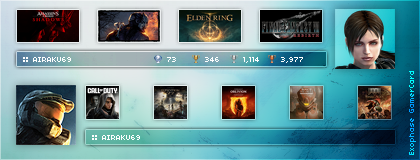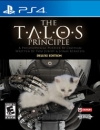Airaku said:
JWeinCom said:
You say that the war between organics and synthetics will continue in any ending besides synthesis. This is absolutely not supported by the text (the game). The most prominent example of a war between synthetics and organics is that between the geth and quarians. And, depending on what you do, you can create a peaceful resolution to this conflict. The other most prominent example is Edi, and you are, even without the synthesis ending, able to coexist peacefully with her. The main proponent of synthesis is Saren, and you are able to convince him he is wrong to the point where he commits suicide.
In the ending, the three choices each have a representative. The synthesis ending is repped by Saren, the control by the illusive man, and destroy by anderson. You spend the first game fighting against synthesis, the second fighting against control. You can convince both Sareen and the Illusive man to kill themselves because they're so wrong about their ideas. So, destruction seems more reasonable in that light. The destruction ending is the only one that has an extra scene at the end as well which is typical of the "true" ending in a game.
"I respect your perception of the story and I do not wished to call you wrong on the matter. However.... I think arguing with the writers and developers of the series is rather... silly. They certainly know the story better than you,, or any of us will."
Perhaps you do not want to call people out for being wrong, however I am perfectly happy to respectfully tell people when they are wrong. You are wrong.
As someone who has fairly extensively studied literary criticism (I have a bachelors degree in English), I can tell you that it is completely unacceptable to use "the writer said so" as a valid explanation. Whenever you want to make any claim about a text, you need evidence from the actual text. If I used the author's intention as an argument about the content of a book, I'd have been failed. We don't use the authors intention as an argument for several reasons.
First of all, the human mind is not a static thing. Minds decline, even those of authors. There is no guarantee that the author will not change their mind over their interpretation, or that they will remain in a stable state of mind. People can lie, be misinterpreted, forget, say conflicting things, or get drunk. For example, George Lucas has given several conflicting comments on whether or not Han solo shot first in Star Wars a new hope. So, if you're going by the author's intentions, you'll have to believe contradictory things, or change your interpretation on their whims.
Secondly, and more importantly, intentions do not matter in the least, really in any circumstance in life. For examlple, if a student writes on a test that 2+2=5, it doesn't matter if they meant to write 2+2=4. They're wrong. If a chef intented to cook a burger well and it's raw inside, their intention doesn't matter. It's raw.
A work stands by itself. The work says what it says. If Casey Hudson says "the main point of Mass Effect 3 is that masturbation is wrong", would you agree with him? I mean, he probably wouldn't, but surely he could right?
If you would not believe that, you probably wouldn't because it doesn't make sense in the game. So, if you would doubt this hypothetical claim, then you must accept that the actual text of a work takes precedence over the word of the author. In which case, you'd have to look at the actual game to evaluate whether your anonymous source at Bioware is correct. And as far as the evidence in the game goes, he is not.
|
Where to start with this.
I'll go with the simple one. "But the peace will not last" This quote clearly sums up the endings and states that the peace between synthetics and organics will only be a temporary one.
I would love to admit that I was wrong. But I am afraid that it is you that is wrong in this matter. You may have an English degree, but I can claim that I do my own writing anomalously, which I do, and that I have a strong understanding of philosophy, which I also do. I studied what a lot of philosophy and A.I. as a form of intelligent life and becoming self-aware is one of the studies in university. I had to write one hell of an essay on that.
You also seem to assume that it was one person that I talked to that works at Bioware. That would be incorrect. I talked to 7 to be precise. Two of them being founding fathers. So no. I actually will call you out on this. Secondly, no I probably shouldn't give names nor should I say anything else other than what I stated in my earlier post. As such is information that is "fine" to spew around. You are not inclined to believe what I say if you do not wish, that doesn't change anything.
As far as Luca's goes. He did re-edit the story and it is Greedo that shot first. We just like the idea of Han shooting first and so we remain stubborn and keep that in our minds. We are wrong to think this, but ignorance is bliss. This is no different than the case at hand. The whole Casey Hudson stating that Mass Effect 3 is about masturbation is just straight up stupid and irrelavent. Casey Hudson is the director of the series and was not the main writer. He did have a lot of control over the story and major key points. Everything went through him and he had major control over the series. The writers were Drew Karpyshyn for Mass Effect and Mass effect 2. And Mac Walters for Mass Effect 2 and Mass Effect 3. If you can't even get this right.... then why are you arguing? The writer is often always right when it comes to their universe. Even if our minds wish to think otherwise, or perceive otherwise. Just because it's bloated with plot points, doesn't change the main theme of the game. Theme would be the proper word I should have used, rather than main plot. For that, I can accept my fault. That was an error on my part.
|
"I'll go with the simple one. "But the peace will not last" This quote clearly sums up the endings and states that the peace between synthetics and organics will only be a temporary one."
Says who..? The anonymous star child that shows up at the end of the game? The one that readily admits that he had been manipulating the illusive man? Who represents the reapers who are known to manipulate organics, and tried to manipulate the villain of the first game to do the same thing he's telling you to do? Who represents a race who literally has armies of deceived organics working for him? What reason do we have to believe this character? You are aware that characters in books are not always truthful and not always right, aren't you? What reason do we have to believe this character? Like, do you instantly believe every weird hologram you see? The star child could be lying to get you to choose the ending he wants. Or he could simply be wrong on the point. Every other piece of evidence in the game shows that synthetics and organics can coexist peacefully. So, we have no reason to trust the random star child who works for a manipulative race of machines whose chief tactic is bending organics to their will.
"I would love to admit that I was wrong. But I am afraid that it is you that is wrong in this matter. You may have an English degree, but I can claim that I do my own writing anomalously, which I do, and that I have a strong understanding of philosophy, which I also do. I studied what a lot of philosophy and A.I. as a form of intelligent life and becoming self-aware is one of the studies in university. I had to write one hell of an essay on that."
You do your writing anomalously? So your work is marked by incongruity and inconsistency? Actually, judging by some of the other things you've said, anomalously might be a bang on description of your writing, butwhy should that make me want to believe you O_o? I'm legitimately confused. Maybe English is not your first language, but that made no sense.
As for anything you know about A.I, I don't really care, unless you happen to live inside the Mass Effect universe. You could have a PHD in robotics and programming and any other relevant fields, and I wouldn't care. It's not relevant to this, because we are not talking about actual AI, we're talking about a game universe. Making an argument about the in game world using real world AI theory would be like Stephen Hawking saying that the Mass Effect relays won't work in the game because of the laws of physics in our universe.
On the contrary, my English degree is relevant because we are dealing with literary criticism, which is a big part of what earning an English degree entails. But, I didn't just say "hey I have an English degree", I went on afterwards to explain the reasoning behind my argument.
"You also seem to assume that it was one person that I talked to that works at Bioware. That would be incorrect. I talked to 7 to be precise. Two of them being founding fathers. So no. I actually will call you out on this. Secondly, no I probably shouldn't give names nor should I say anything else other than what I stated in my earlier post. As such is information that is "fine" to spew around. You are not inclined to believe what I say if you do not wish, that doesn't change anything."
Why do I think that you only talked to one person at Bioware? Because that's what you said. To quote you.
"Again, I directly asked someone who worked on the game on this matter. I can't name them but they did confirm this to me. "
So yeah, I am absolutely not going to believe you on this, because a changing story and anonymous sources that can't be named are hallmarks of liars. I'm not saying that you are a liar... just that you really really sound like one. Partially because what you're saying makes no sense. Why exactly would you be unable to name who told you this? Would someone really get fired for telling you the MAIN THEME of the game? I mean, is the MAIN THEME supposed to be a secret? If it's the MAIN THEME shouldn't it be evident? Is the theme a special secret that only you can know about? JOHNSON! How dare you tell someone what this game is about! You're fired! Pure nonsense.
But hey, let's roll with this for a bit. Suppose you talked to someone who would get in trouble for telling what the main theme is. The only way they could be in trouble for telling you the main theme is if the theme is some kind of secret. If the theme is a secret, that means it is NOT clear in the game itself. And if the theme is not clear in the game, then how can you say that's the main theme?
So, whether you're lying or telling the truth, it makes no sense.
Edit: Actually, I was somewhat wrong. In your reply to me you said you spoke to someone. Before that in your original post, you said you spoke to two people.
" Well the ending isn't so bad when you think about it. I talked to about 2 people from Bioware regarding it."
So it was 2, then 1, and now 7. A shifting story like that is definitely a pattern with people who are lying.
As far as Luca's goes. He did re-edit the story and it is Greedo that shot first.
Lucas said originally that Greedo always shot first, even in the original, and he changed the film to show that clearly. Then, he changed his claim. So, when watching the original version, if we go by what Lucas said, than Han both shot first and didn't shoot first. I'm not going to go any more into this.
"Whole Casey Hudson stating that Mass Effect 3 is about masturbation is just straight up stupid and irrelavent. Casey Hudson is the director of the series and was not the main writer. He did have a lot of control over the story and major key points. Everything went through him and he had major control over the series. He did have a lot of control over the story and major key points. Everything went through him and he had major control over the series. The writers were Drew Karpyshyn for Mass Effect and Mass effect 2. And Mac Walters for Mass Effect 2 and Mass Effect 3. If you can't even get this right.... then why are you arguing?"
I used Casey Hudson because you said you spoke to "someone" at Bioware. This of course was before I knew that someone was actually seven people, and may be 100 people by now. So I chose "someone" from Bioware, and his name was the first that came to mind. So, chill on the snark. And who it is doesn't matter at all, which I'll explain why later. Regardless of that, I'm genuinely puzzled why the person who was in charge of the product and had final say over everything would not be considered a reliable source, based on your point of view.
"The writer is often always right when it comes to their universe."

This literally makes no sense. Are they often right or always right? Can't be both.
"The writer is often always right when it comes to their universe. Even if our minds wish to think otherwise, or perceive otherwise. Just because it's bloated with plot points, doesn't change the main theme of the game. Theme would be the proper word I should have used, rather than main plot. For that, I can accept my fault. That was an error on my part."
I don't care if you call it theme or plot. What I care about is that you've given absolutely no reason for us to consider the organics vs synthetics theme as more important than the others in the game. And if it's bloated with other plot points and those plot points are focussed on more than organics vs synthetics then yes that does change the main theme of the game. Cause... that's how theme works.
Since you kind of dodged my question, I'll prove my point in a simple way..
The only way the argument that the author's statement supercedes text holds is if an author LITERALLY can never say something wrong about their work. And it is absolutely possible for an author to say something that is wrong about their work.
My last post was about how much I want a panda fur coat. If you think it was about something else, you are wrong, because I am the author. Just to be absolutely clear, my last post was DEFINITELY about how much I want a panda fur coat.
If you are going to insist that the author's extratextual claims are more important than what the writing actually says, then you have to accept that my last post was indeed about my desire for a panda fur coat. If you want to say that I'm wrong, then you have to provide proof in the post that what I said was not about panda coats. To do so you'll have to accept the premise that text can contradict extratextual claims by the author.
So, what is it? Was my last post about panda coat coats, or can authors be wrong about what they wrote if the text disagrees with their statement? These are mutually exclusive possibilities so you have to choose one. If you choose neither, I will accept that your point is conceded.
That's a very simple summary of it. But if you'd like, you can read Roland Barthe's "Death of the Author" or Wimmsatt and Beardsley's "The Intentional Fallacy" which will more clearly explain it. You'd find very few people currently in the field of literature still naive enough to say that the author's word is definitive.
























































